Table of Contents
How to Prepare Notes for UPSC
Making notes is seen to be an essential part of the UPSC preparation process. Making notes involves connecting, reviewing, and synthesising concepts. The Notes Making Strategy for UPSC for the UPSC Prelims and Mains exams must be fully understood by the applicants.
The candidates will be able to review the key ideas and basics through the notes they have prepared for the exam with the aid of mind maps or linear sorts of notes. As the Mains stage of the exam requires writing illustrative solutions to the questions, the UPSC notes are more crucial. A candidate’s level of success can be determined in large part by how effectively they take notes for the UPSC.
How to Make notes for UPSC from Newspaper
Reading newspapers is incredibly important for the UPSC Civil Services Examination because both the UPSC Prelims and Mains syllabus give a significant amount of weight to the dynamic section. Learn how to write newspaper notes for the IAS test in this post.
Before beginning the current affairs preparation, it is practical to be well-versed in the IAS test format and the UPSC Syllabus. It will take a lot of time for a novice with limited knowledge of the UPSC syllabus and pattern to read and prepare from the newspapers. Here are some guidelines on how to take notes that are useful from:
- Editorials, defence news, the economy, constitutional amendments, the environment, government laws and plans, international affairs, social issues, judicial decisions, etc. should all receive the most attention.
- Ignore: news that is solely political, news about celebrities, hyperlocal news, and the majority of sports news.
- Editorials are crucial because they offer thoughts and insight on a range of topics. Editorials may include skewed viewpoints. However, it is required of that person as a UPSC applicant to identify arguments both in favour of and against the topic. This aids in developing a person’s perspective, which must be impartial.
How to Make Notes of NCERT for UPSC
You can adhere to the two greatest techniques to learn how to create NCERT notes for UPSC IAS preparation are linear and pattern formats. To organise brief notes in a linear format, utilise headers, highlights, and capital letters along with symbols, abbreviations, and bullet points. On the other hand, pattern note-making can be done by arranging keywords and concepts in the style of a mind map by utilising colours and diagrams to make difficult ideas easier to understand.
Step 1: Before reading the complete book, carefully review the table of contents from any UPSC book on the subject you’ve chosen.
Step 2: Take any challenging chapter and attempt to break it down into sections and subsections. By further subdividing any portion, you can also make reading simpler.
Step 3: When creating these UPSC NCERT notes, try to avoid using long keywords and stick to short points and bullets like place name, area, year, etc.
Step 4: Ensure that each note ends with a context or chronological event.
Step 5: Try to accurately pinpoint the locations on maps for History & Geography assignments rather than investing too much time on correct or orderly diagrams.
Step 6: In order to create your UPSC Mains Strategy, try to write brief notes on the main points from each section or subsection at the end of your revision notes.
How to Make Notes for UPSC Prelims
The UPSC preliminaries include of objective-type questions. The notes ought to be written similarly so that the pupils can identify the correct response. Since the kids do not need to practise writing descriptive replies for this stage, brief notes and mind maps can be helpful.
When organising the NCERT notes for the UPSC, several crucial details, such as the basic idea, theories, etc., can be taken into consideration. The crucial illustrations and examples that will support your responses. The examples can also be used to help you recall the idea. Timelines and new words must also be noted.
How to Make Notes for UPSC Mains
Writing evocative responses to the questions is a requirement for the UPSC mains stage. Candidates must take note of the source’s examples, pictures, and diagrams in addition to the answers. They will be able to perform well on the mains exam thanks to this. It is crucial for applicants to comprehend the subject before writing it in their own words. This will help students practise writing answers for the UPSC mains.
The mains exam approach should be slightly different from the prelim’s exam strategy. The candidates’ chosen optional UPSC subjects must be practised in a similar manner. In this round of the hiring process, taking notes is quite important.


 UPSC CMS Admit Card 2025 Out: Download L...
UPSC CMS Admit Card 2025 Out: Download L...
 UPSC Study Material for Prelims & Ma...
UPSC Study Material for Prelims & Ma...
 NATO Countries List 2025, Members, Funct...
NATO Countries List 2025, Members, Funct...





















